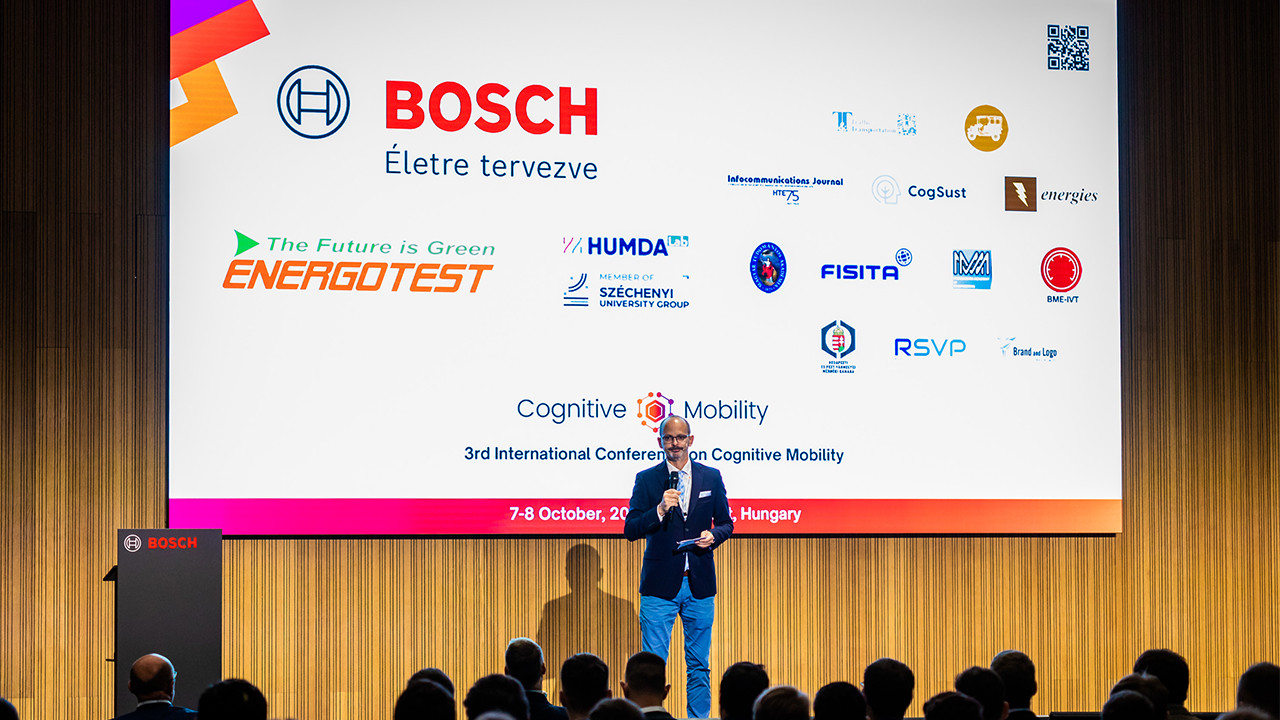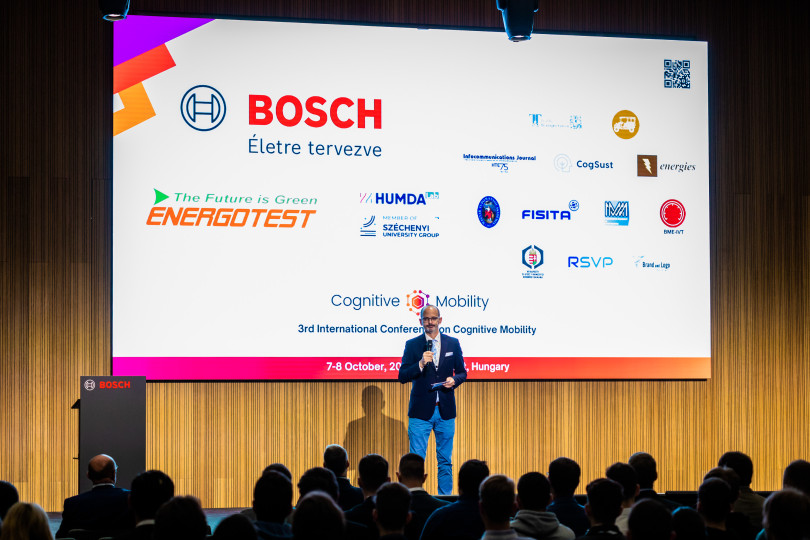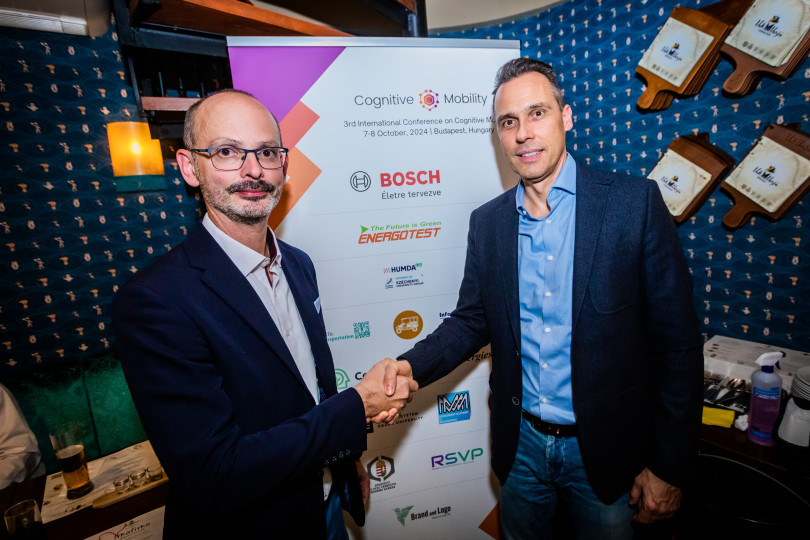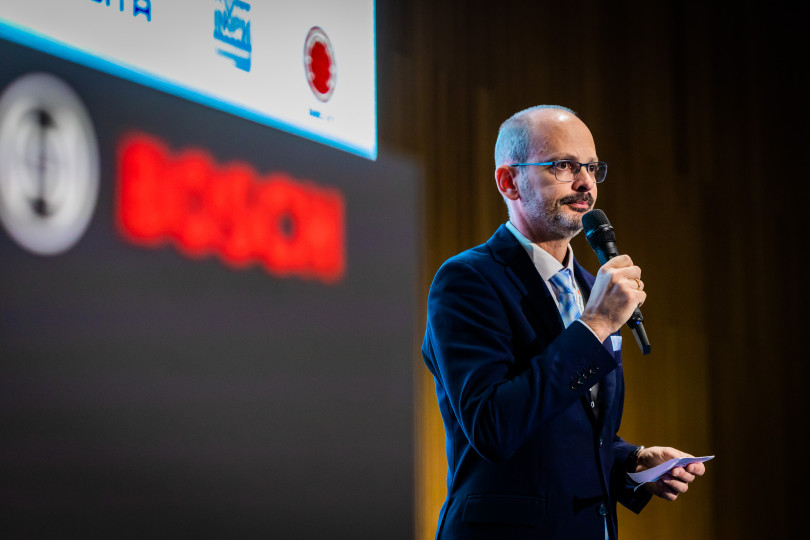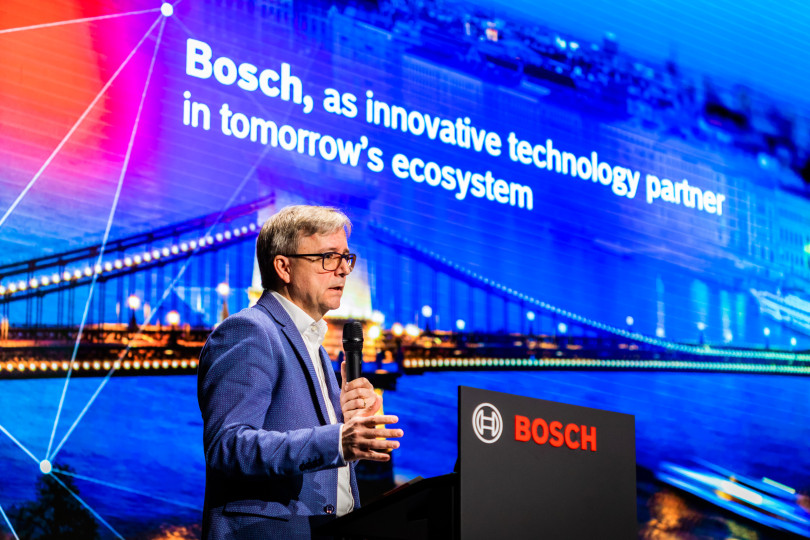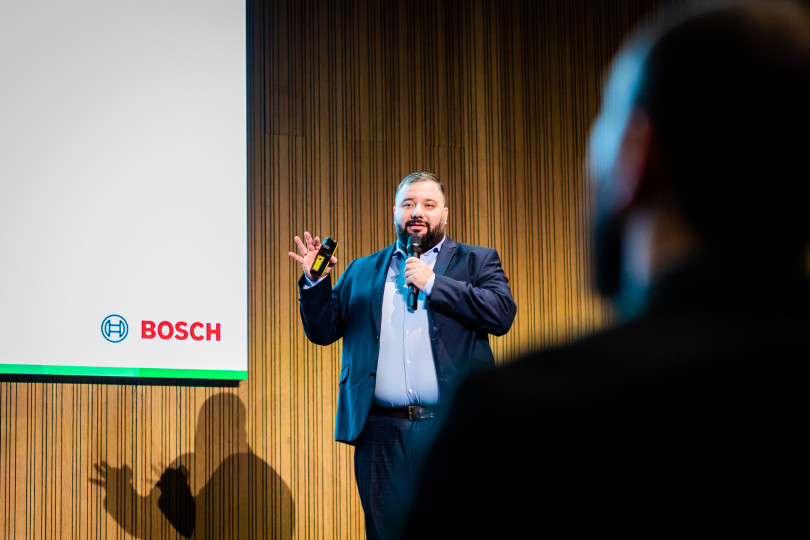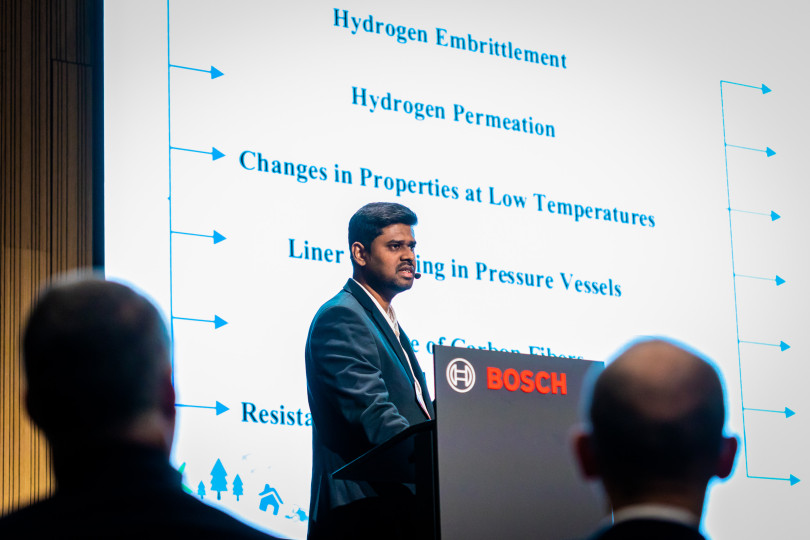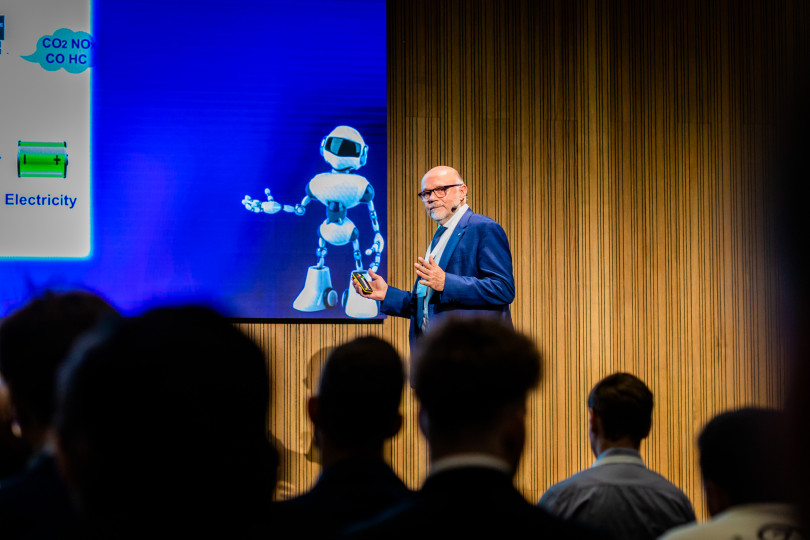Budapest – The sustainability of our vehicles, cities and transport systems requires an integrated approach in which industry, the natural and social sciences and the arts work together to find answers to the challenges of the future. This is the idea behind the 3rd International Conference on Cognitive Mobility 2024 (short form: Cognitive Mobility 2024) conference, which took place on October 7-8 at the Bosch Budapest Innovation Campus, in professional collaboration with Bosch Hungary.
The focus of this year's Cognitive Mobility conference was on futuristic engineering solutions such as smart cities, traffic management with artificial intelligence, vehicle-to-vehicle communication and future energy sources, among others.
International knowledge sharing in Budapest for the third time
“The mobility of the future is no longer just an engineering issue, as the world is facing global challenges such as the climate crisis, scarcity of energy resources and the continued growth of cities. Solutions to these new problems can only be found through global interdisciplinary cooperation and an innovative approach. This is why it is significant that the international representatives of cognitive mobility met in Hungary for the third time and shared their knowledge with each other and the interested public” – said Prof. Dr. Máté Zöldy, head of the BME-Bosch Competence Center for Innovative Vehicle Technologies and organizer of the Cognitive Mobility 2024 conference.
“At Bosch, we believe in the power of collaboration. We are consistently building an innovation ecosystem where industry and academia, business and science, work together responsibly to find the best solutions not only for today’s, but also for tomorrow’s challenges. I am proud to be the professional patron and host of the International Conference on Cognitive Mobility at the Bosch Budapest Innovation Campus for the third year in a row,” said András Kemler, head of real estate management of the Bosch Group in Hungary and the Adriatic region.
Competing energy sources: Bosch believes that technological diversity is the future
Electric, hybrid, fuel cell, internal combustion, synthetic fuel, hydrogen, battery-powered vehicles – no wonder we are scratching our heads. There are already many competing energy sources and technologies in the automotive industry today. But are they mutually exclusive developments, and can we, or indeed should we, say which propulsion system is the future? At the Cognitive Mobility 2024 conference, Csongor Horváth, senior expert at the Bosch Engineering Center Budapest, assessed the drive systems of tomorrow. “At Bosch, we don't believe that there is a single engineering solution that alone provides the answer to everything, but we are committed to technological diversity. Experience has shown that for different mobility purposes, for different vehicles, different propulsion modes, different technologies and different energy sources can guarantee efficiency in the long term,” said Csongor Horváth at the conference.
Possible cost reduction in electric cars: Dr. István Szászi receives the Cognitive Mobility 2024 conference scientific award
On the recommendation of the international scientific board of the Cognitive Mobility 2024 conference, the prestigious ‘Best Paper Award’ and the accompanying certificate for the best publication was awarded this year to Dr. István Szászi, head of the Bosch Group in Hungary and the Adriatic region, who has made outstanding achievements in the fields of technological innovation, technical and engineering research in recent decades.
Mobility is in constant evolution, electrification is one of the megatrends of today, which still has a number of challenges to overcome, one of which is to reduce the cost of the materials used. Dr. István Szászi's award-winning work offers an alternative to the currently costly and material-scarce solutions of electric motors.
The secret language of vehicles: a new concept from Bosch
Various cameras, radars and sensors are now a feature of modern vehicles, enabling them to sense their surroundings and support driving, and to perform various levels of automated driving. But what happens when conditions are such that these sensors cannot produce enough data to drive safely? At the Cognitive Mobility 2024 conference, Bosch engineers presented to an international audience a new concept based on radio communication that allows vehicles on the road to talk to each other and share data. This enables our vehicles to carry out driving operations in a stable manner even under adverse conditions.
Researchers are working on safe hydrogen mobility solutions
We often hear that hydrogen could be the greenest energy source of the future, not only for industry but also for transport. One of the keys to a hydrogen economy based on water splitting is solving the engineering challenges of storing and transporting hydrogen, with a particular focus on safety. At the Cognitive Mobility 2024 conference, Prof. Dr. Dhinesh Balasubramanian, a leading researcher at MEPCO University in India and one of the world's leading authorities on the subject, analyzed the smart, data-driven methods and simulation techniques that will lead to increasing the safety of hydrogen mobility, helping hydrogen become an accepted and practical alternative for transport.
The most environmentally friendly vehicle is the one that does not run unnecessarily: smart cities could be the real solution
Is it enough to develop cleaner vehicles or can we do more to protect the environment and climate? This was the question Prof. Dr. Barna Hanula, associate professor at Széchenyi István University, sought to answer in his plenary lecture at the Cognitive Mobility 2024 conference. According to the expert, the most important thing is to plan and operate our cities in such a way that as many passengers and goods as possible can reach their destinations via the shortest possible routes, with the fewest possible vehicles. We should organize traffic in such a way as to minimize unnecessary vehicle movements, such as searching for parking spaces, and once the vehicle is moving, to avoid the need to stop, start, slow down and accelerate again and again. This wastes energy, increases air pollution, congestion and the risk of accidents. With advanced cognitive mobility systems, cities can be run in the future with lower energy consumption, less environmental impact and greater safety,” said Prof. Dr. Barna Hanula. The range of innovative technologies towards smart cities is constantly expanding, including the Bosch Smart City solutions already available.
Mobility on an artistic level
The Cognitive Mobility 2024 conference also featured a presentation by students of the Interaction Design department from the Moholy-Nagy University of Art and Design (MOME), who focused on the interaction between vehicles and humans. Their approach will be to make the cars of the future rolling computers with sensors that will push their potential towards full personalization. The MOME Mobility Design Lab is involved in the design of cars, drones, motorcycles and micro-mobility devices, and is also mapping the sustainable transport systems of the future, with Bosch supporting their work as an innovative partner through the Bosch-BME Competence Center for Innovative Vehicle Technologies.
Zita Hella Varga
Phone: +36 70 667-6374
Bosch has been present in Hungary since 1898 with its products. After its re-establishment as a regional trading company in 1991, Bosch has grown into one of Hungary’s largest foreign industrial employers with currently eight subsidiaries. In fiscal 2023 it had total net sales of 2.207 billion forints and consolidated sales to third parties on the Hungarian market of 343 billion forints. The Bosch Group in Hungary employs more than 18,300 associates (as of December 31, 2023). In addition to its manufacturing, commercial and development business, Bosch has a network of sales and service operations that covers the entire country.
The Bosch Group is a leading global supplier of technology and services. It employs roughly 429,000 associates worldwide (as of December 31, 2023). The company generated sales of 91.6 billion euros in 2023. Its operations are divided into four business sectors: Mobility, Industrial Technology, Consumer Goods, and Energy and Building Technology. With its business activities, the company aims to use technology to help shape universal trends such as automation, electrification, digitalization, connectivity, and an orientation to sustainability. In this context, Bosch’s broad diversification across regions and industries strengthens its innovativeness and robustness. Bosch uses its proven expertise in sensor technology, software, and services to offer customers cross-domain solutions from a single source. It also applies its expertise in connectivity and artificial intelligence in order to develop and manufacture user-friendly, sustainable products. With technology that is “Invented for life,” Bosch wants to help improve quality of life and conserve natural resources. The Bosch Group comprises Robert Bosch GmbH and its roughly 470 subsidiary and regional companies in over 60 countries. Including sales and service partners, Bosch’s global manufacturing, engineering, and sales network covers nearly every country in the world. Bosch’s innovative strength is key to the company’s further development. At 136 locations across the globe, Bosch employs some 90,000 associates in research and development, of which nearly 48,000 are software engineers.
The company was set up in Stuttgart in 1886 by Robert Bosch (1861–1942) as “Workshop for Precision Mechanics and Electrical Engineering.” The special ownership structure of Robert Bosch GmbH guarantees the entrepreneurial freedom of the Bosch Group, making it possible for the company to plan over the long term and to undertake significant upfront investments in the safeguarding of its future. Ninety-four percent of the share capital of Robert Bosch GmbH is held by Robert Bosch Stiftung GmbH, a charitable foundation. The remaining shares are held by Robert Bosch GmbH and by a corporation owned by the Bosch family. The majority of voting rights are held by Robert Bosch Industrietreuhand KG. It is entrusted with the task of safeguarding the company’s long-term existence and in particular its financial independence – in line with the mission handed down in the will of the company’s founder, Robert Bosch.
Additional information is available online at www.bosch.hu, iot.boschblog.hu, www.bosch.com, www.iot.bosch.com, www.bosch-press.com, www.twitter.com/BoschPresse

